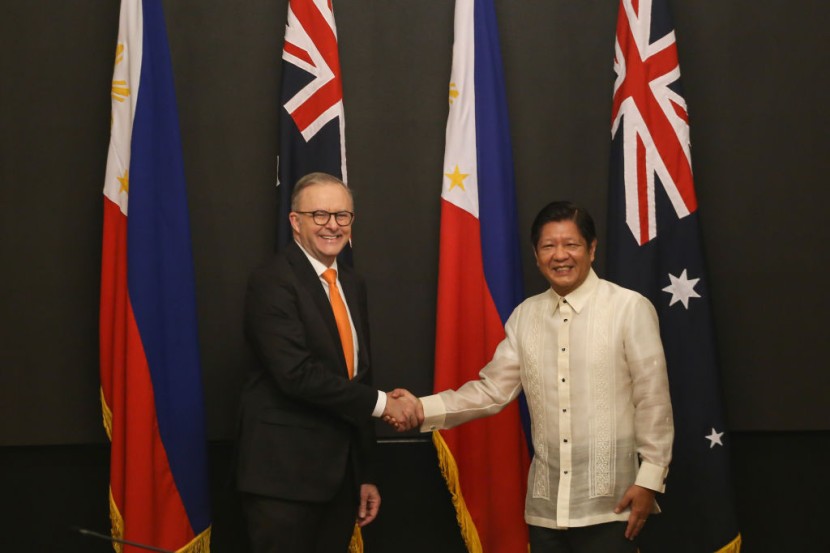
With the signing of a strategic partnership on Friday, the Philippines and Australia strengthened their security and economic alliance to counter China's expanding regional influence.
The agreement was finalized after a meeting between Philippine President Ferdinand Marcos and Australian Prime Minister Anthony Albanese in Manila.
Australia Affirms Ties With the Philippines
Albanese's visit, which marks the first bilateral discussions with an Australian prime minister in Manila in 20 years, is the latest in a series of visits by senior members of his administration to the archipelago nation since Marcos assumed the presidency in 2022.
Under the terms of a strategic partnership, the countries will seek to expand cooperation in a variety of areas, including defense, security, climate change, and education.
Australia regards a strategic partnership as the greatest level of bilateral relations. Beijing claims almost the entirety of the South China Sea, despite a judgment by the international community that its position is illegal.
The Philippines, Vietnam, Malaysia, and Brunei all stake claim to contiguous portions of it. The former president of the Philippines, Rodrigo Duterte, shifted the country's conventional security alliances away from the United States and toward China. The Marcos administration has attempted to reverse this policy, as per SCMP.
Last month, the Australian and Filipino military conducted a significant joint exercise near the contested waters. Marcos, his defense minister Gilberto Teodoro, and the Australian defense minister Richard Marles observed the event.
Read Also: US Announces $175 Million Ukraine Support Package, Includes Anti-Armor Rounds, Air Defense Equipment
South China Sea Dispute
According to AFP via Yahoo, under the terms of a strategic partnership, the countries will seek to expand cooperation in a variety of areas, including defense, security, climate change, and education.
China's growing assertiveness on Taiwan and the militarization of artificial islands in the contested South China Sea have prompted Canberra and Washington to strengthen defense ties with Manila, a longtime ally.
Marcos thanked Albanese for his "strong support" for the Philippines as it endeavors to defend itself against "not valid" maritime claims, a thinly veiled reference to China.
Albanese referred to the two nations as "great friends" and expressed his desire that his visit would assist in elevating their relationship to "an even higher level."
After a Philippine resupply mission to Second Thomas Shoal in the Spratly Islands was obstructed by China Coast Guard vessels using water cannons on August 5, these exercises ensued, sparking a diplomatic dispute and international indignation.
Friday's negotiations included signing a memorandum of understanding for reciprocal work and holiday visas. The nations also agreed to convene an annual meeting of defense ministers.
Human Rights Watch had urged Albanese to "seriously" debate human rights during his discussions with Marcos, including advocating for an end to Duterte's bloody drug war.
Meanwhile, Australia and China have made progress in resuming "unimpeded trade," Australian Prime Minister Anthony Albanese said Thursday as he met Chinese Premier Li Qiang at a regional summit in Indonesia. Albanese added that the progress should continue.
Australia's views will not always align with China's, "but we understand dialogue is absolutely critical," Albanese said. Per VOA News, Li said Albanese was welcome to visit China this year, and the Australian leader agreed.
The confirmation of the visit to Beijing, the first by an Australian leader to its largest trading partner since 2016, is a significant step towards the stabilization of relations.
In response to Australia's request for an investigation into the origins of the COVID-19 pandemic, China suspended diplomatic exchanges in 2020 by imposing restrictions on a dozen Australian exports.
Since Australia elected a Labor government in 2022, tensions have decreased, and China has recently removed tariffs on Australian barley exports. However, Australia wants restrictions on other exports, such as wine and lobster, to be abolished.
China is Australia's largest export market for iron ore, and Treasurer Jim Chalmers stated on Wednesday that a downturn in China would contribute to the economic strain on Australia.
Related Article : Watchdog CREW Files Lawsuit to Ban Trump from Colorado's 2024 Ballot








